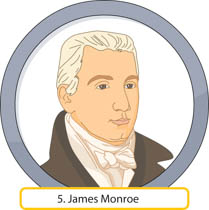 |
| Monroe was later to become the nation's 5th white president. |
Following the atrocious War of 1812, the federal government was in a delicate position. They had issued war bonds of up to $16 million and were being implored by members of the aristocracy and landed gentry to invest these bonds in a New Federal Bank, a bank so new and so federal that even the Old Bank would have been ashamed. The temerity! John C. Calhoun was having a field day fielding these pressures from On High (aristocracy) and translating them into a cohesive and pungent Plan (New Bank). Secretary of State James Monroe even approved, stating rather bluntly:
"If I were to be rather blunt, I would state that the Establishment of this new federal Institution of Monies will be just the feather that the federal cap of economik Stability has been searching for. And to Cap it all off, I will insist that People of the highest Order (Freemasons such as myself, my son, young JM2, and current Prez, J. Madison, among other Diginitaries) should be the likeliest Candidates for countenancing all up on the new freshly printed Bank Notes. I have a succulent Profile, so says everyone in the Department of State--I need state no more on this stately Subject."Subjecting his department to such flagrant episodes of self-worship and narcissism hardly kept Monroe from being deeply involved in every aspect of the newly reinstated Bank of the United States (BUS). Working closely with President Madison and Alexander Dallas, the Secretary of the Treasury, William Jones was named as BUS President in late 1816. Now that somebody was at the helm of the new federal bank--driving the BUS, if you will--progress was sure to ensue. Or was it?
 |
| William Jones, the great-great-great grandfather of Dean Jones, said little to nothing while serving as a member of Madison's cabinet. |
As recently stated with titular eloquence, the Madison administration was far from enjoying any sort of progress as a result of the reestablishment of the BUS. One of many troubles to manifest was in the form of the BUS President himself, William Jones. It was eventually discovered that, among other quirks innate to his "idiosyncratic Style of Leadership," as he fondly put it, Jones was illiterate. He was not some kind of Wunderkind with numbers, either. However, while still a member of Madison's cabinet, Jones was often seen fondling an abacus, which lent him an air of sophistication and mystery. Monroe himself had made mention of this in his memoirs (dated from the months following Madison's first election) that Jones seemed:
"a steady Ship of silent Wit and Intelligence. Methinks I would daresay conjecture that the man with mysterious Eyes, who says little to nothing at any cabinet meeting or otherwise, maintains a deep mystery of withheld Wisdom, choosing instead to communicate his incorruptible Sagacity to that wooden object of Oriental Antiquity that he carries about. It comes as no surprise that when silence befalls the Room, and all that is Audible is a faint clink of wooden Beads, there is nothing short of Genius permeating and surrounding the human shell of that Demigod, Wm. Jones."
 |
| James Madison, Imperator |
President Madison was enraged (contributing to what historians would soon thereafter refer to as the beginning of "Madison's Mad Months," a time of deep existential anxiety for the President, both as a statesman and as a short person, that lasted well into his post-presidency). The nearly 35 year old republic was experiencing an extreme rise in inflation that went beyond any known precedent. In a pathetic attempt at damage control, William Jones started selling land at $2 an acre, with the hopes of suppressing the continuing sharp trajectory of inflation. What resulted was that a lot of people bought land that they didn't really want, out of feeling guilty for the still fledgling American economy. Jones himself bought some property near present day St. Louis. And why not? With $2 an acre, it was practically a steal! Jones praised himself for having such good ideas that fit so well with his Deist convictions. Everyone else was annoyed and overwhelmed at all their new properties. Some people even felt obligated to "build homes" in these "damnedly endless tracts of land," to quote Farmer Charles Jenkins, formerly of South Carolina. The nation was seething with bubbles of discontent, from a boiling temperature yet unknown to their times.
 |
| Omnia vincit amor |
* It should come as no surprise, dear reader, that Jones' autobiography, "Strength in Indifference" was greeted with complete indifference by the reading public, not only because it was written by a man who didn't understand how to write words and had to send his publisher a 545 page tome of pictographs for editing down into words, but also that it revealed in exquisite detail Jones' philosophy of doing little to nothing at all times, and only doing something when it directly served his interests. This ideology, also known as "Deism," had been well documented elsewhere and by literate men of letters, and therefore rendered his manuscript doubly irrelevant. What should come as a surprise, however, is that no one in Madison's administration or in the greater federal government had ever bothered to read the book, even if just to investigate Madison's selection for BUS President. A historian wonders how such a man, whose autobiography featured a chapter blatantly titled: "Why Centralized Banks Are Destined to Fail" would have remained such an unknown threat to the integrity of the Madison administration.



























